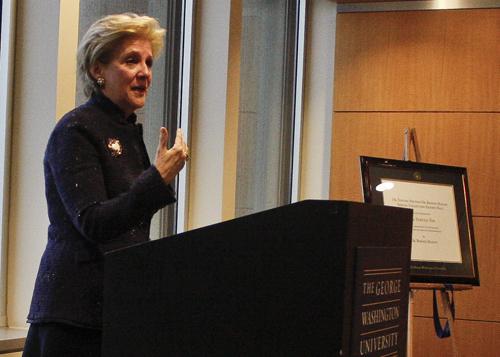
This post was written by Hatchet reporter Ana Buling.
As a child, Yehuda Nir learned to recite Catholic prayers at the request of Nazi soldiers.
Nir, a Jew who escaped imprisonment and death during the Holocaust, hid in plain sight from the Nazis by purchasing papers from a Catholic priest that said the Polish Jew was a Polish Catholic.
Students paid tribute to Nir’s life and accomplishments Tuesday, unveiling an exhibit as part of their course, “Remembering the Holocaust.” The exhibit, based on Nir’s memoir, “The Lost Childhood,” is now on display on the seventh floor of Gelman Library as part of the Kiev Judaica collection.
Nir’s friends and family gathered for the official opening of the special collection containing 1,700 books and documents about the Holocaust donated by Nir’s wife, Bonnie Maslin, an alumna. Nir was unable to attend the event due to health reasons.
Maslin said the only way to prevent another Holocaust is to link history with emotion. Feelings, Maslin said, keeps humans from becoming bystanders.
“[He] made a difference,” Maslin said. “And he was never a bystander.”
Hannah Hamill, the exhibit coordinator and a second year graduate student in the museum studies program, said Nir’s memoir was “unlike any other Holocaust-era memoir” she had ever read.
University Provost Steven Lerman said the exhibit “illuminates some of the wonderful aspects of the human spirit.”
“Certain things are better understood through stories,” Lerman said. “One’s personal story is an enormously powerful way of understanding what happened.”




